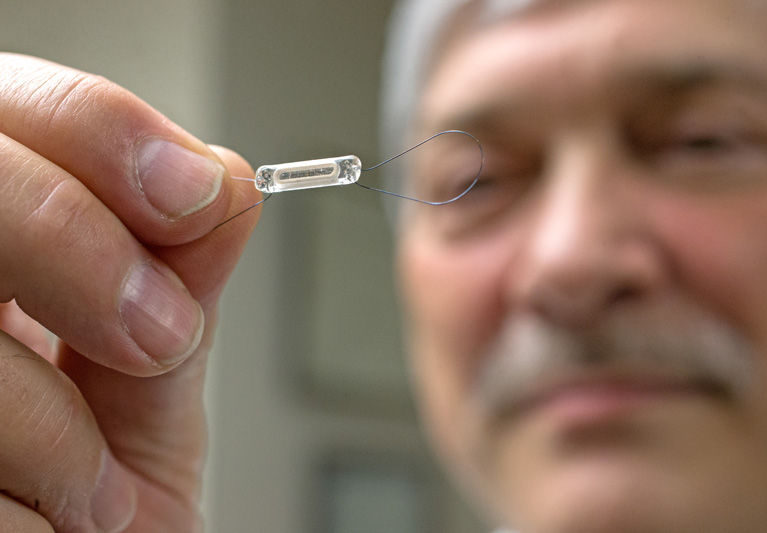
Being hospitalized for heart failure is one of the most traumatic and disturbing health crisis anyone can go through. Equally disturbing, however, is the rate at which heart failure patients are re-admitted to the same hospitals, for the same reason, just days or weeks after initial treatment. For the past three years, the Indian River Medical Center has been working to radically reduce those re-admission numbers and today, because of the success it has had in doing so, it joins an elite group of hospitals employing a brand new technology to further improve heart patient outcomes.
The CardioMEMS™ system transmits daily information on heart function using a miniaturized wireless sensor implanted in the pulmonary artery. It measures the pressure within that artery and transmits that information to a secure “cloud-based” data collection system that monitors the information and sends it to the patient’s healthcare provider. Should that pressure information exceed a set of custom-designed parameters, the patient’s healthcare provider or physician is automatically notified of potential problems and can then adjust medications or implement other treatment options to avoid re-hospitalization and improve the patient’s condition and quality of life.
The device has huge potential for reducing medical costs as well as for improving patient care. Kaiser Health News reports nearly one-in-five Medicare heart patients nationwide are re-admitted to hospitals within 30 days of their initial discharge. The cost for those re-admissions is a staggering $17.5 billion a year. Patients, their families and their insurers bore the brunt of those costs until last year when Medicare began penalizing hospitals for excessive heart patient re-admissions.
Medicare’s logic was simple. Hospitals, they reasoned, had little financial incentive to ensure that patients got the care they needed once they were discharged and, more to the point, they benefited financially when patients did return for more treatment.
Empowered by the Affordable Care Act, in 2013 Medicare proceeded to force some 2,000 hospitals nationwide to forfeit more than $280 million in federal payments because of unacceptable re-admission rates for heart failure patients. IRMC, meanwhile, was not fined at all in that first year and in this fiscal year it received a “perfect” rating. In fact, on October 28, the American College of Cardiology placed IRMC on its Top 10 list of hospitals with the lowest re-admission rates for heart failure patients in the country.
Jason Nance, director of cardiovascular services at IRMC, proudly points out that two years before Medicare started penalizing hospitals for those excessive re-admissions, IRMC had already started its own outpatient heart failure clinic and, in the process, caught the eye of a very important medical device manufacturer. “That clinic,” Nance points out, “is still the only outpatient heart failure clinic in the area” and that medical device manufacturer apparently noticed.
In May of this year the Food and Drug Administration gave its stamp of approval to the CardioMEMS™ heart failure monitoring system. In clinical trials, the system significantly reduced heart patient hospital re-admissions. The following month, St. Jude Medical, (not affiliated with St. Jude’s Children’s Hospital), completed a $435 million purchase of the company that created the device. This week IRMC became just the 11th hospital in the country outside the FDA trials to implant the CardioMEMS™ device in patients.
“The excellent work our medical staff has done in structuring our heart failure programs here,” boasts Nance, “really improved our outcomes and when we talked to St. Jude Medical, they were willing to partner with us.”
Dr. Joshua Kieval, interventional cardiologist at IRMC agrees. “I think St. Jude was looking at hospitals that had a lot of expertise or at least a lot of focus on congestive heart failure . . . all our cardiologists were already on board and they were happy with the idea of the heart failure clinic. We also have a great nurse practitioner and we have a medical director for the heart failure clinic who is on top of things, too, which all helped.”
For the present, CardioMEMS™ will only be used in patients with the most severe heart conditions. Typically, that would be limited to cases classified by the New York Heart Association’s ranking system as “class three” heart patients.
Dr. Kieval adds that, “with every new product you want to screen carefully. Initially there will be some interaction with St. Jude so that we are actually using [the system correctly]and approving appropriate patients. I think it will be slow going initially but I think there will be lot of interest as word gets out.”
The interest is apparently already there. If all goes according to plan, six patients – not just one – will leave IRMC with a CardioMEMS™ implants on Dec. 12,the first day the procedure will be done at the hospital.
Nance cautions that “currently there is not a national coverage determination for private insurers such as Blue Cross Blue Shield. It’s on a per-case approval basis for most insurance companies,” but he quickly adds that, “Medicare has given approval for it” and he expects most insurance companies to follow Medicare’s lead. Nance also added that the survival rate of CardioMEMS™ patients is two-and-a-half times better than those without the device.
“Some new data came out recently at the American Heart Association Conference about the re-admission rates with CardiMEMS™,” said Dr. Kieval. “For those folks who get the device implanted, there is a 70 percent reduction in heart failure re-admissions.” Since more than a million Americans are hospitalized with heart failure each year, reducing re-admittance rates by 70 percent would constitute a huge improvement for both patients and insurers, including Medicare.
As individual hospitals and St. Jude Medical analyze the data they collect, the use of the CardioMEMS™ device could conceivably be expanded to a wider cross-section of heart patients, but for now IRMC and its heart failure outpatient clinic have an exciting new tool at their disposal that the vast majority of hospitals in this country do not.



